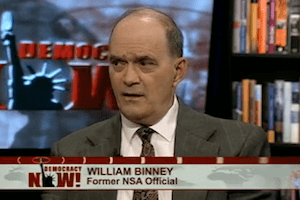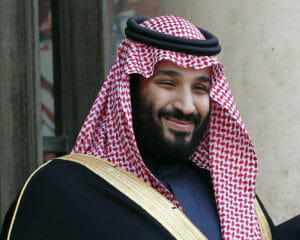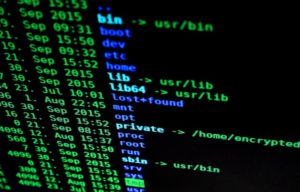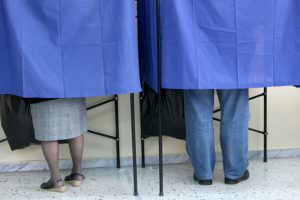Truthdigger of the Week: William Binney
It's the first day of the HOPE conference, and hackers and technology enthusiasts have come to hear NSA whistle-blower William Binney give the meeting's keynote address.
NEW YORK — William Binney is sitting in a dark room on the 18th floor of the Hotel Pennsylvania. A patient, unmoving expression is on his face. A low-volume electronic song fills the room. Before him, packed between two rows of columns strapped with glowing lights, a few hundred hackers and technology enthusiasts sit and wait. It is the first day of the HOPE conference, and we’ve come to hear Binney give the meeting’s keynote address.
HOPE, which stands for “Hackers on Planet Earth,” is a three-day festival that has been held in New York City every other year since the early ’90s. It attracts hackers from all over the United States. Some have come from even farther away. The underlying theme of this year’s meeting is freedom of creativity and expression in the digital realm. It is precisely that theme that makes Binney, a former 30-year code breaker for the National Security Agency, well suited to deliver HOPE’s opening address.
After a flattering introduction, Binney, whose appearance suggests he’s just another government square, opens his mouth and, surprisingly, a soft, intimate, bucolic voice comes out. He was once a “hillbilly” from central western Pennsylvania with a math degree, he explains. A “small town guy with small town ethics” who grew up with a rifle in his hand. With patriotic convictions, but without a matching desire to kill people, he volunteered to join U.S. Army operations in Europe when America deployed troops to Vietnam in 1965. There his aptitude for mathematics became apparent, and his superiors put him to work studying and breaking codes. Three years later, when U.S. intelligence anticipated but failed to prevent the slaughter of the Tet Offensive, Binney grasped how important efficient and effective intelligence operations were.
One year later, Binney was scooped up by the NSA. Stuffed in a “back, back room,” Binney excelled at his work. Hearing the ease and enthusiasm with which he talks, one suspects he was one of the smartest guys there, doing complex work with little effort, smiling pleasantly and chuckling in short staccato breaths throughout the day. The agency grew as the years went by, and eventually it decided to split into two groups: one that handled analytics and one — which would become more powerful — concerned largely with funding. Binney’s problems started there. He had a difficult time getting anyone outside of analysis to help him with his tasks, so he did a lot of the work himself.
During this time of relative isolation, Binney began to develop programs that collected and organized the agency’s data electronically. When forced to seek assistance from private contractors, he found that his colleagues on the agency’s financial end twisted his requests in ways that drove money toward themselves without solving the agency’s problems. In response, Binney took an officer’s class that allowed him to deal with the agency’s private partners himself.
From there Binney led an effort between different groups in the organization to develop an automated analysis program. He insisted on building the program from scratch, allowing it to achieve the best possible performance while ditching the “leeches” — companies that were consuming taxpayer dollars while providing no valuable service — that the NSA had accumulated from the private sector. There was opposition of course, but from Binney’s telling, he won. And one believes him. His arguments were so convincing and he was so good at his work that one congressional committee completely bypassed the agency’s finance division and directed a couple of million dollars to him alone, money that he did not request.
The analytic group developed a program called ThinThread that automatically collected and analyzed email and telephone data while protecting users’ privacy. It was a smashing success, so much so that Binney’s boss, the new director of the NSA Transition Office (NTO) and a former executive of an association of defense and intelligence contractors called Science Applications International Corporation (SAIC), told Binney to keep quiet about it. Showing that the group had solved the problem of data collection would make the agency’s corporate partners redundant, Binney explained, and that would be the end of their funding. Against his will, Binney was successfully silenced. Later on, in 2002, the NSA contracted corporations previously overseen by the new NTO director, including Pentagon favorites Boeing and Booz Allen Hamilton, to develop a new data-mining program called Trailblazer. With a starting price tag of $280 million and untold more that followed, ThinThread’s successor was set to do just what Binney’s program did, but without the privacy protections. Within four years it ran over budget, produced nothing but “colorful power points” and was shut down. But not without enriching a number of private interests.
The emerging culture of corporate patronage disgusted Binney. He was “this naive kid from the hills of Pennsylvania, thinking operations was important” when it was the “money and the flowing and the feeding and the feasting” that the agency had come to value. Realizing that his bosses were uninterested in creativity and solving problems, in 2001 Binney decided to quit.
But before he left, 9/11 happened.
“Even though there was all this corruption around me,” he said, he still wanted “to do something to stop the bad guys.” But his second thoughts would not last long. Just a week after the attacks, the Bush administration began spying on everyone in the country, a plan Binney said it had nursed since February 2001 when it asked telecommunications companies to provide the government with private information about their customers.
In the months after 9/11, Binney found himself in the horrifying position of seeing his government turn the software he had developed into a program for spying on his fellow Americans. He resigned and fought to hold back the flood. He and a small group of former colleagues approached members of the House Intelligence Committee, including Deputy Nancy Pelosi and Chairman Porter Goss, to expose what the agency and administration were up to. But they were ignored. In Binney’s words, they were “naive” enough to think that “if people in certain positions of government knew this was going on … they would take some action to correct it.” The government did take action eventually. In an attempt to silence the whistle-blowers, the FBI raided their homes 2007. The agents who pointed guns at Binney and his family found nothing incriminating on him, and the event ended with Binney revealing classified information to officers who were not cleared to know it. The agent in charge of the raid knew that everything Binney said was true. He hung his head in silence while Binney spoke.
When officials later realized they had nothing on Binney, they offered him immunity if he agreed to give information on fellow whistle-blower Tom Drake. Binney told his lawyer to “tell those bastards to go piss up a rope.”
“These people are basically cowards,” he tells the audience at HOPE. “It didn’t scare me,” he says, complicating the common notion that calling out wrongdoing always takes courage. “What it did was make me mad.”
“These people are still hiding behind this ‘national security’ curtain,” he says. “All I want to do is move that aside and say ‘See … pay attention to that man behind the curtain, because he’s affecting us. He’s affecting all of us,” because he’s setting the stage for an “Orwellian state.”
Binney’s speech concludes with the same wild applause that punctuates his talk whenever he speaks lines like that. Courage or not, for giving us a detailed look into the largest spying operation that has ever existed, and for vowing never to stop, William Binney is our Truthdigger of the Week.
An earlier version of this article said that HOPE “supposedly” inspired Julian Assange to create WikiLeaks. This could not be confirmed.
Your support matters…Independent journalism is under threat and overshadowed by heavily funded mainstream media.
You can help level the playing field. Become a member.
Your tax-deductible contribution keeps us digging beneath the headlines to give you thought-provoking, investigative reporting and analysis that unearths what's really happening- without compromise.
Give today to support our courageous, independent journalists.




You need to be a supporter to comment.
There are currently no responses to this article.
Be the first to respond.